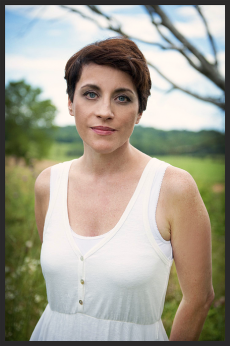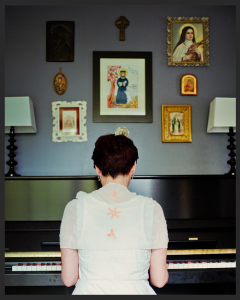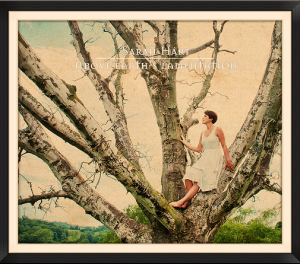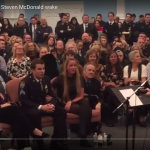 “I asked you for the light. You gave me a long dark night.”
“I asked you for the light. You gave me a long dark night.”
Grammy nominated singer-songwriter Sarah Hart penned those lyrics to God during the anger phase of a “downward spiral through grief” that began with the death of her beloved grandfather. Though Sarah was and remains Catholic, that alone didn’t lessen the pain she was enduring.
During an interview on “Christopher Closeup” about her most personal and moving album to date, “Above Earth’s Lamentation,” she revealed, “I’m not ashamed to say I was very angry at God, and I really wrestled with Him. I wondered, ‘How could you let this happen? Why? Did you forget us?’ It’s a very honest lyric. So many people, though, relate to that song. I have gotten a lot of feedback, and that’s the song people feel attached to.”
The Soundtrack Through Grief
While there’s plenty of literature on grief, Sarah looked for solace in music because it touches her on a deeper level. Unfortunately, she couldn’t find anything appropriate outside of classical music, so she reviewed the songwriting she did during her own struggles and found they all dealt with exactly that topic. She made “Above Earth’s Lamentation” to be a healing blessing to everyone walking through grief now and in the future.
One of the album’s greatest strengths is that it doesn’t put the false veneer of a happy face on grief. Sarah explained that was a conscious choice: “Sometimes when people are walking through grief – and it can be grief of anything: addiction or divorce or death – and I think a lot of times our Christian answer is to put our arms around someone and say, ‘It’s gonna be okay. Now get over it.’ In truth, these are big, gaping wounds that, if we are believers or not, still take so much time to heal. The healing is faster when we know God and cling to Him, that’s for sure. But it doesn’t change the fact that walking through it is going to be the same. I look at it like a valley, where you cannot go around it; you have to go through it. It’s just a matter of how long you’re going to stand on that cliff before you walk through it.”
Love’s Burden and Mercy’s Refining
That walk will be painful, as Sarah sings about in “This Is Not Forever,” whose lyrics include the lines “Every burden love has given will be beautiful in time again” and “I will walk through mercy’s refining until the day I see the silver lining.” We generally think of love and mercy as feeling good, but Sarah acknowledges they bring “burdens” and “refining.” Why?
She explained, “That’s something Ecclesiastes says – that the beautiful burden is from God. And the mercy we experience is through the lens of understanding God’s mercy for us. It really is a beautiful thing and a burdensome thing, all at the same time…I think if we are at a place in our Christian faith where we expect everything to be good and light and perfect, we’re about to be terribly disappointed. So we have to understand that even the burdens are a mercy. And even with the hard stuff, the love of God is present in it.”
The Positive Side of Doubt
 Far from diminishing her faith, Sarah’s doubts and struggles actually strengthened it. That’s why she believes that doubt can be a good thing: “If I am just blissfully ignoring my questions, I’m not going to have a deep relationship with God. But if I’m constantly striving to know Him and sometimes to doubt Him and to wander, that makes my relationship with Him much stronger…I know people who do not doubt and are blissful believers – and that’s a beautiful thing too. I am not one of those. I question things. For me, it is not just a matter of heart; it’s a matter of mind and spirit. All three have to work together.”
Far from diminishing her faith, Sarah’s doubts and struggles actually strengthened it. That’s why she believes that doubt can be a good thing: “If I am just blissfully ignoring my questions, I’m not going to have a deep relationship with God. But if I’m constantly striving to know Him and sometimes to doubt Him and to wander, that makes my relationship with Him much stronger…I know people who do not doubt and are blissful believers – and that’s a beautiful thing too. I am not one of those. I question things. For me, it is not just a matter of heart; it’s a matter of mind and spirit. All three have to work together.”
All three did come to work together for Sarah, leading her to a place of hope, as revealed in the lyrics of “Hallelujah is Our Song” – “What joy we have / For the stone is rolled away / And the tomb holds nothing now. / No sting of death / No power over sin or grave. / Hallelujah is our song. / What hope we have / Even in the longest night / For the light will overcome. / And we shall live / Sinners, we will rise to saints. / Hallelujah is our song.”
Facing Your Own Mortality with Hope
Sarah’s comfort with the topic of death has grown so much that she even included a song called “One Beautiful Day,” in which she reflects what she wants her own passing to be like some day. Despite the fact that the topic sounds depressing, the song contains a genuine aspect of hope and joy.
Sarah revealed that she wrote those lyrics while thinking of the day her cancer-stricken grandmother died: “I was with her, my mother and my two aunts, and we sat on the bed around my grandma and we prayed the rosary and sang every song we could think of. We held her hand and told stories and we laughed. When it was over, I remember thinking, ‘Please, Lord, let me go like that.’ It was so beautiful and such a celebration of her. It was sad and hard and there were a lot of tears, don’t get me wrong, but it was definitely a celebration. I think that is what I was clinging to in that song. I was thinking, ‘When I go, I know you’ll be sad, but I want you to celebrate with me too because we will see each other again and this is not a scary thing. This is a beautiful thing. This is what we as Christians have been waiting for and hoping for and longing for.’”
 Listeners will find that “Above Earth’s Lamentation” provides them with a beautiful confluence of hope, despair, faith doubt, melody and poetry. It was a labor of love for Sarah, and she hopes it can be a blessing for others: “My hope and prayer is that God will allow it to reach whoever it needs to reach. As a writer, I always find that you think you’re writing from your experience, but that personal walk is actually a universal one, and there are a lot of people who can relate to what you’ve been through even though you think you’re writing the most personal song in the world. But it really is because the human experience is so shared.”
Listeners will find that “Above Earth’s Lamentation” provides them with a beautiful confluence of hope, despair, faith doubt, melody and poetry. It was a labor of love for Sarah, and she hopes it can be a blessing for others: “My hope and prayer is that God will allow it to reach whoever it needs to reach. As a writer, I always find that you think you’re writing from your experience, but that personal walk is actually a universal one, and there are a lot of people who can relate to what you’ve been through even though you think you’re writing the most personal song in the world. But it really is because the human experience is so shared.”
(To listen to my complete interview with Sarah Hart, click on the podcast link:)
Christopher Closeup podcast – Guest: Sarah Hart
















